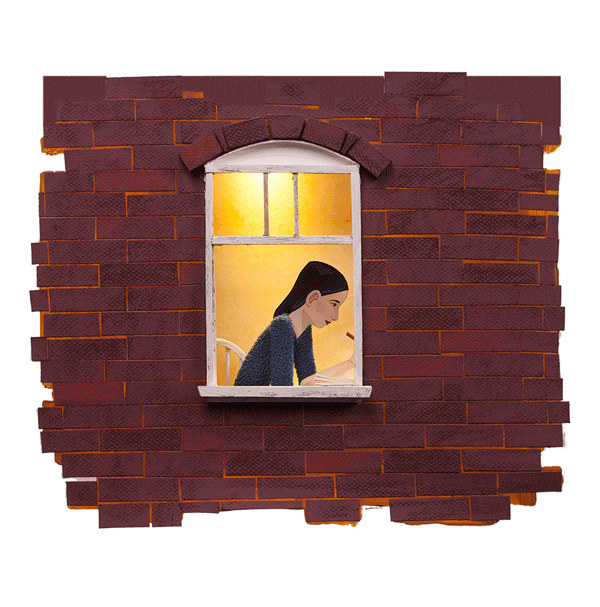The first person to congratulate me on getting into Harvard was Mark Zuckerberg. I clicked on the link in my acceptance email to find a picture of him looking back at me with his characteristic blank smile, as “Congratulations” appeared on the screen in white sans serif font above his head. At the time I was too thrilled to pay much attention, but later the choice of spokesperson felt strange to me. “Didn’t he drop out?” I wondered.
I thought I’d applied to Harvard to escape aspiring Zuckerbergs. My family moved to Menlo Park in 2008, just in time to see Silicon Valley transform from a chain of nondescript California suburbs into the tech hub it is today. As I drove to school each morning I passed landmarks of the corporate world, from the cluster of venture-capital firms on Sand Hill Road to the Facebook headquarters off the 101.
Silicon Valley felt like a company town—any ambition was bent back toward tech culture. Moms cooed over luncheons about how someone’s son who got a good score in AP Calculus could code for Facebook, or how someone’s daughter who gave a good speech at an assembly could be a CEO. Many of my high-school classmates dreamed of working five minutes away from their childhood homes, in the same tech jobs their parents held. This isn’t a bad thing—after all, who could criticize someone for wanting to work in America’s seat of innovation?
But I didn’t see myself coding or starting a company. I spent most of high school reading books my teachers recommended and writing furtive bits of fiction between classes. Most of my friends viewed my literature habit as if I were collecting stamps—a quirky, old-fashioned hobby, nothing to make a career of. Some reassured me that reading or writing could help toward a job at a start-up, writing press kits or interview responses. Or, at the very least, that knowing how to write could get me into college, which could then get me a satisfying corporate career. I knew I didn’t want to work in the Valley, but everything else felt irrelevant, or unrealistic, so I learned to keep quiet.
Cambridge couldn’t have felt more alien; it was startling to see so many buildings made of earthquake-unsafe bricks, covered in snow, all smashed together rather than spread out in 1970s corporate parks and strip malls. I don’t remember much about the admissions tour, but the moment I considered applying was when I sat in a café and listened to a grad student talking about his dissertation on horror movies without any of the self-deprecation that would have inevitably accompanied it back home. I began dreaming of trading Palo Alto’s freeways and açaí bowls for Cambridge’s libraries and coffee shops.
Since then, I’ve been able to fulfill many of my high-school dreams, dragging countless plastic bags full of books out of Widener and publishing articles in crumbling literary outlets like The Harvard Advocate. But it has also dawned on me that Silicon Valley is not as far away as I once thought; that many of my peers chose Harvard precisely because of its connection to tech culture.
The College markets Silicon Valley to 500 undergraduates each semester in its most popular class: Computer Science 50. Officially an introductory course, CS 50 functions as a microcosm of corporations like Facebook and Google. It has all the bells and whistles of a Silicon Valley behemoth—free food, T-shirts, a slogan (“This is CS 50”)—giving undergrads a sense of what could await them post-graduation. The class then culminates in a live-streamed festival in which students present their projects in booths, modeled after start-up conferences in the Valley like TechCrunch. Tech recruiters attend the fair, giving students the amorphous promise that this class can be their golden ticket to getting a job out West.
CS 50’s sloganeering seems at odds with the intellectual refuge I’d imagined Harvard to be: I couldn’t imagine even McKinsey setting up tables in introductory Ec classes the same way tech companies put up booths at the CS 50 fair. But even those outside CS enclaves seemed resigned to a Silicon Valley takeover. Advocate members look at falling subscription rates and joke about mining Bitcoin to keep us out of the red; my professors cling half-heartedly to buzzwords like the “digital humanities,” conveying a sense that the end is nigh. I’ve found myself contemplating learning Python, and coaching friends on their Google applications, as if I’d never left home in the first place.

Animation by Dave Wheeler
Undergraduates looking to strike it rich in the Valley tend to split into two camps. The first group aims to work for existing tech outfits like Twitter or Google, companies known not only for paying well but also for providing employees with luxurious perks such as company gyms, subsidized apartments in trendy cities, and free food. There’s also an advantage to applying for summer internships, since the competition for entry-level jobs in the Valley increases precipitously post-graduation. On-campus recruiting allows students to cut the line, and 50 percent of those who land Facebook internships in their junior summer find a return offer waiting for them in the fall, practically erasing senior-year future-job anxiety.
Those in the second group hope to start a company of their own, dropping out of school to eat ramen on the floor of a cluttered Palo Alto flophouse as they dream up the Next Big Thing. While very few actually have the chutzpah to quit college, aspiring founders fancy themselves disruptors and iconoclasts, pitching their nascent startups in the same hazy, delirious tone that idle writers use to talk about their always-deferred novels. University resources like the i-lab and the i3 Harvard College Innovation Challenge cultivate student start-ups, grooming pitches and matching budding CEOs up with industry mentors.
These two camps seem to reflect opposing values—one prizes security and conformity, the other risk and rebellion—but they aren’t as different as they appear. Many aimless undergraduates suffer from the perennial fear that they must choose between making money and changing the world. In Silicon Valley, though, it seems that they can have both. They can gamble on starting a company, potentially coming up with a new technology and making billions, or work for a Google or a Facebook, content with their financial security and their place in a company invested in innovation. No matter what path they choose, Silicon Valley appears to offer undergraduates a form of disruption just subversive enough to upset the status quo, but not so subversive as to upset their parents. It’s no wonder Zuckerberg became the face of Harvard for incoming freshmen like me.
In fact, last year Zuckerberg returned to campus to give the main address on Commencement day, making a case for the Harvard education he did not complete. He admitted that this made him an unusual choice as speaker, joking that the speech would be the first thing at Harvard he ever finished. But he argued that school gave him something beyond a degree. After all, the Harvard Facebook is the company’s namesake; he started the site, he said, to make the world feel more like a tight-knit college community.
This aspiration manifests in the company’s corporate culture as well: Facebook calls its headquarters a “campus,” with amenities including cafeterias, gyms, and shuttle services with free WiFi. The job application requires essays, interviews, and tests, not unlike the intellectual acrobatics one goes through to get into an elite college. And in the minds of those undergraduates who aspire to work there, both Silicon Valley and Harvard provide prestige, intellectual fulfillment, and a coddling space in which these still unformed geniuses can figure out what they want to do with the rest of their lives. Perhaps I was wrong to accuse Silicon Valley of invading Harvard; instead, they were never so separate in the first place.
Sometimes on my nighttime Widener trips I lug my bag of books past CS 50’s office hours, which turn the normal tomblike silence of the elegant second-floor Loker Reading Room into a cacophony of amateur coders typing and laughing and barking questions at passing TFs. It reminds me of a start-up’s open-office workspace: the high ceilings, the lack of cubicles, the programmers clustered around each table illuminated by their laptops’ glow. I know that some of these undergrads will end up working in similar—if less ornate—rooms across the Valley. I picture them, arriving on their first day of work, only to find themselves already at home.








